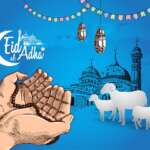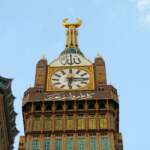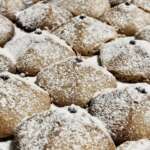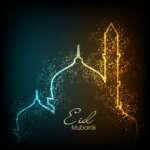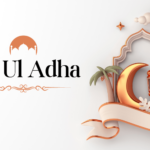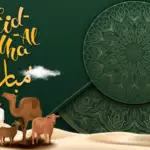When did the Eidul Adha start?
About Eidul Adha Holiday
Eid ul Adha, also known as the “Festival of Sacrifice” is an important religious holiday celebrated by Muslims worldwide to commemorate Prophet Abraham’s readiness to sacrifice his son Ishmael to God. It is celebrated on the 10th day of the 12th month of the Islamic lunar calendar as a single day of celebration and joy. Muslims celebrate this festival with great religious enthusiasm and fervor.
Eid ul Adha marks the willingness of Prophet Ibrahim (pbuh) to sacrifice Ishmael, his beloved son, out of obedience to Allah’s commandment. It is a reminder to Muslims around the world to follow the example of Prophet Ibrahim in being willing to surrender their individual will to that of God’s. In addition, it also provides a chance to get together with family and friends and celebrate the joys of obedience. During this time, Muslims offer sacrifice of animals such as sheep, cows, or goats and share portions of the meat with family, friends, and those in need. It also serves as a reminder of how Muslims should never forget to put Others before and above Self.
Eidul Adha: The Feast of Sacrifice
Eidul Adha, also known as the Feast of Sacrifice, is a major religious holiday celebrated by Muslim communities around the world. It is one of the two Eid festivals observed by Muslims, with the other being Eidul Fitr. Eidul Adha is a time for family, community, and spiritual reflection, as well as a reminder of the importance of sacrifice and generosity.
Today, Eidul Adha is not only celebrated by Muslims but has also become a symbol of diversity and inclusivity, as people from different backgrounds come together to observe this holiday. In this article, we will explore the origins, traditions, and cultural significance of Eidul Adha, along with its modern-day observances, geographical spread, and social and economic impact.
Key Takeaways:
- Eidul Adha is a major Islamic holiday that celebrates the willingness of Prophet Ibrahim to sacrifice his son as an act of obedience to God.
- The holiday is a time for family, community, and spiritual reflection, and also a reminder of the values of sacrifice and generosity.
- Eidul Adha has evolved into a symbol of diversity and inclusivity, with people from different backgrounds coming together to celebrate this holiday.
- The holiday has a significant impact on local businesses and tourism and is celebrated in various regions around the world.
History and Origin
The origins of Eidul Adha can be traced back to the story of Prophet Ibrahim (Abraham) and his son, Prophet Ismail (Ishmael). According to Islamic belief, Prophet Ibrahim received a dream from God instructing him to sacrifice his beloved son as a test of his faith. Prophet Ibrahim, being a devout follower of God, shared this dream with his son, who willingly submitted to God’s will.
As Prophet Ibrahim was about to fulfill the sacrifice, God intervened and provided a ram as a substitute for his son. This ultimate act of obedience and sacrifice by both father and son is commemorated during Eidul Adha, honoring their unwavering faith in God.
Historical Context
Eidul Adha has been celebrated for centuries and holds significant historical importance in the Muslim community. The holiday falls on the tenth day of Dhu al-Hijjah, the twelfth and final month of the Islamic lunar calendar, and is considered to be one of the holiest months of the year. This month is also known as the Hajj month, as it marks the time when Muslims from all over the world gather in Mecca to perform the holy pilgrimage of Hajj.
The significance of Eidul Adha is also seen during the Hajj, where pilgrims perform the symbolic act of sacrifice by slaughtering an animal and distributing its meat to the less fortunate. This ritual of sacrifice has its roots in the story of Prophet Ibrahim and serves as a reminder of the values of selflessness and charity.
Significance and Meaning
Eidul Adha holds great cultural and spiritual significance in the Muslim community. It is a time for reflection and gratitude, as well as a reminder of the importance of sacrifice and generosity. The holiday serves as a reminder of the story of Prophet Ibrahim, emphasizing the belief that submission to God’s will is the ultimate act of faith.
As Muslims gather with their family and friends to celebrate this holiday, they also take the time to reflect on their blessings and share their food and wealth with those in need. It also serves as a symbol of unity with the global Muslim community, as people from different backgrounds come together to celebrate this holiday.
Cultural Significance
Eidul Adha is deeply ingrained in the cultural traditions of the Muslim community. The holiday is known for its festive atmosphere, where people dress in their finest attire and decorate their homes with lights and colorful banners. Families and friends gather to offer prayers at the mosque and share a feast, including traditional dishes and sweets.
Another significant aspect of Eidul Adha is the act of sacrificing an animal in remembrance of Prophet Ibrahim’s sacrifice. The meat from the animal is then divided into three parts – one for the family, one for friends and relatives, and one for the less fortunate, emphasizing the importance of sharing and generosity.
Symbols and Decorations
The most prominent symbol associated with Eidul Adha is the crescent moon, which is also featured on the flags of some Muslim countries. The crescent moon symbolizes the beginning and ending of the lunar month, representing the start of Eidul Adha celebrations.
In addition to the crescent moon, decorations also involve colorful lights, banners, and artwork depicting the Kaaba, the most sacred site in Islam, located in Mecca. Images of Prophet Ibrahim and his son during the act of sacrifice are also commonly displayed.
Traditions and Celebrations
Eidul Adha is a time for celebration and gathering with loved ones. Muslims around the world observe this holiday with various traditions and customs, usually involving prayer, food, and giving back to the community.
The day begins with a special Eid prayer, known as Salat-al-Eid, followed by a sermon given by the imam (religious leader). After the prayers, families gather for a feast, which includes traditional dishes such as biryani, kebabs, and sweet treats like sheer khurma.
In some parts of the world, particularly in Muslim-majority countries, people also participate in traditional games and activities such as camel races, parades, and street food festivals. Children are also given Eidi, which is a small amount of money as a gift from elders.
Food and Cuisine
Food plays an essential role in the celebrations of Eidul Adha, with traditional dishes and desserts being a highlight of the holiday. Some of the dishes commonly prepared for the feast include lamb or beef biryani, kebabs, lamb or chicken curry, and sheer khurma, a sweet dish made with vermicelli, milk, and nuts.
In some regions, the traditional meat of the sacrificed animal, usually a goat or sheep, is also prepared and served as part of the feast. These dishes not only reflect the cultural heritage of the community but also serve as a reminder of the religious significance of the holiday.
Attire and Costumes
During Eidul Adha, Muslims often dress in their best attire, usually traditional garments such as salwar kameez or thobes. For men, it is common to wear a specific type of embroidered cap called a kufi, while women often wear henna on their hands and feet. In addition to traditional attire, children are often seen wearing colorful traditional garments and costumes, adding to the festive atmosphere of the holiday.
Geographical Spread
Eidul Adha is celebrated in many regions around the world, with significant differences in traditions and customs. The holiday is widely observed in Muslim-majority countries such as Pakistan, Egypt, Indonesia, and Saudi Arabia. However, it is also celebrated in other parts of the world, including North America, Europe, and Australia.
In some countries, such as India and Bangladesh, Eidul Adha has specific regional variations and customs. For example, in India, the holiday is known as “Bakrid” and is observed with fireworks and colorful processions.
Modern-Day Observations
In today’s globalized world, Eidul Adha has evolved to be a more inclusive and diverse holiday, with people of different backgrounds and beliefs coming together to celebrate. The holiday has also been influenced by modern elements, with advancements in technology making it easier for families and friends to connect and celebrate even if they are not physically together.
In addition, social media has allowed Muslims to share their celebrations with a wider audience, showcasing the rich diversity and cultures within the community. In recent years, there has also been a growing trend of eco-friendly celebrations, with Muslims promoting sustainable practices and minimizing waste during the holiday.
Interesting Facts and Trivia
- The holiday of Eidul Adha is known by different names in various regions, including Qurban Bayram in Turkey, Kurban Bajram in Bosnia and Herzegovina, and Eid-el-Kabir in Nigeria.
- In some countries, it is common for people to purchase animals for sacrifice and keep them at home for a few days before the actual day of sacrifice.
- Eidul Adha is also known as the “Festival of Sacrifice,” “Big Eid,” and the “Greater Eid.”
- The sacrificed animal must meet specific criteria, such as being healthy and free from any defects.
Legends and Myths
Eidul Adha has its share of myths and legends, with many variations among different cultures and regions. One of the most commonly believed myths is that the bones of the sacrificed animal will grow to be horns in the afterlife, serving as a mark of the animal’s generosity and obedience.
Eidul Adha is also believed to be a time when good deeds are rewarded by God, and it is said that every person’s good deeds are weighed on a scale, with the animal’s sacrifice tipping the scale in the person’s favor.
Social and Economic Impact
Eidul Adha has a significant impact on local businesses and tourism in many parts of the world. The holiday is a peak time for businesses, especially those selling livestock, traditional garments, and food.
During this time, many Muslims also participate in traveling to visit family and friends or to perform the Hajj pilgrimage, contributing to the tourism industry. In addition, the tradition of giving back to the community by distributing meat to the less fortunate also has positive social and economic implications, promoting a sense of unity and charity within the community.
Environmental Aspect
As with any large-scale celebration, Eidul Adha has an environmental impact, particularly in terms of waste and pollution. To minimize this impact, there has been a growing trend in eco-friendly celebrations, with people using sustainable and environmentally friendly products, as well as ensuring proper waste management.
In some regions, there are also initiatives to donate the animal’s hide after sacrifice, which can be processed into leather and used to benefit the community.
Global Relevance
Eidul Adha has cultural and religious significance, not just for Muslims but also for people around the world. It is a time to celebrate diversity and inclusivity, as well as learn about the traditions and customs of different cultures.
In today’s connected world, people from different backgrounds can learn and understand the values of sacrifice, generosity, and unity, which are essential themes of Eidul Adha. This global relevance highlights the importance of promoting cultural understanding and respect.
Other Popular Holiday Info
Eidul Adha is a holiday celebrated worldwide and holds great cultural and religious importance. The holiday is a time for joy, reflection, and generosity. While it is most often associated with the Muslim community, it has become a symbol of diversity and inclusivity, bringing people from different backgrounds together to celebrate and share in the festivities.
Conclusion
Eidul Adha is a holiday that is rich in both cultural and spiritual significance. It is a time for reflection, gratitude, and generosity, as well as a celebration of diversity and inclusivity. As Muslims around the world gather to commemorate this holiday, it serves as a reminder of the values of sacrifice and unity, not just within the community but also with people from different backgrounds. Whether you are a Muslim or not, Eidul Adha offers important lessons and insights into the rich culture and traditions of the Muslim community, making it a holiday that is truly worth celebrating.
How to Say "Eidul Adha" In Different Languages?
- Albanian
- Kurban Bayrami (sq-AL)
- Arabic
- عيد الأضحى (ar-EG)
- English
- Eidul Adha (en-GB)
- French
- Aid-el-kébir (fr-FR)
- German
- Opferfest (de-DE)
- Greek
- Είδι Άμας (el-GR)
- Hindi
- ईद-उल-अज़हा (hi-IN)
- Indonesian
- Iedul Adha (id-ID)
- Italian
- Eid-al Adha (it-IT)
- Jordanian Arabic
- عيد الأضحى (ar-JO)
- Kazakh
- Курбан байрам (kk-KZ)
- Kurdish
- Eîd elKeir (ku-IQ)
- Malay
- Hari Raya Qurban (ms-MY)
- Persian
- عیدتقبیله (fa-IR)
- Russian
- Курбан байрам (ru-RU)
- Somali
- Eidul Adha (so-SO)
- Spanish
- Fiesta del Sacrificio (es-CO)
- Turkish
- Kurban Bayramı (tr-TR)
- Urdu
- عید الأضحى (ur-PK)
Eidul Adha Also Called
The Eidul Adha holiday is also known as the Festival of the Sacrifice or the Feast of Sacrifice.Countries where "Eidul Adha" is celebrated:
FUN FACT:
In year 7th century, Eidul Adha is celebrated on July 19 for the first time.HOLIDAY CHECK: We strive for accuracy and fairness. But if you see something that doesn't look right, please click here to contact us!
Travel Recipes, Food and Cuisine
Food and Cuisine - Eidul Adha
Eidul Adha, also known as the "Festival of Sacrifice," is an important holiday celebrated by Muslims around the world. It marks the end of the Hajj pilgrimage to Mecca and commemorates the story of the prophet Ibrahim's willingness to sacrifice his son Ismael as an act of obedience to God. As families and friends come together to celebrate this joyous occasion, food plays a vital role in bringing everyone together. Let's explore the distinct food and cuisine that make Eidul Adha a truly unforgettable celebration.Signature Dishes
One of the most iconic dishes associated with Eidul Adha is the Qurbani meat, referring to the sacrificial meat from an animal, typically a sheep, goat, or cow. This meat is then divided into three parts, with one-third given to the poor and needy, one-third shared with friends and family, and one-third kept for the household. This tradition symbolizes generosity and the importance of sharing with others, especially during this holiday season. Another popular dish during Eidul Adha is Biryani, a spicy rice dish that originated in the Indian subcontinent. This aromatic dish is made with basmati rice, meat (usually chicken or beef), and a blend of fragrant spices, making it a favorite among both meat and rice lovers. Traditional drinks like Rooh Afza, a refreshing rose-flavored syrup mixed with water, and Laban, a yogurt-based drink, are also common during Eidul Adha festivities. These drinks help to combat the summer heat and provide a sweet and satisfying refreshment.Regional Variations
While the dishes mentioned above are common across different countries, there are some regional variations in the cuisine for Eidul Adha. For example, in Turkey, lamb is the preferred choice for Qurbani meat, whereas in Pakistan, beef is more commonly used. In Egypt, Molokhia, a thick stew made with leafy greens and meat, is a popular dish during this holiday.Recipes
No celebration is complete without delicious food, and Eid-ul-Adha is no exception. Here are some classic holiday recipes that are a must-try during Eidul Adha.Classic Holiday Recipes
1. Qurbani meat: To cook this traditional dish, begin by marinating the meat with yogurt, ginger, garlic, and a blend of spices such as cumin, coriander, and garam masala. After marinating for a few hours, cook the meat slowly over low heat until it is tender and falls off the bone. Serve with rice or naan bread for a hearty and flavorful meal. 2. Biryani: In a large pot, sauté onions, garlic, and ginger until fragrant. Then add in the marinated meat and cook until browned. Next, add spices like cinnamon, turmeric, and cardamom, along with the basmati rice and water. Let it cook on low heat for about 20 minutes until the rice is fully cooked and the water is absorbed. Serve with raita, a refreshing yogurt-based side dish, and a side of vegetable curry. 3. Laban: In a blender, mix together plain yogurt, fresh mint leaves, and a pinch of salt. Serve chilled with ice cubes for a refreshing and cooling drink.Modern Twists on Traditional Flavors
1. Qurbani sliders: For a modern twist on Qurbani meat, you can make sliders with mini burger buns, shredded meat, and a variety of toppings like cheese, onions, and pickles. This is a great option for entertaining a large group of people. 2. Biryani stuffed peppers: Cut the tops off of bell peppers and stuff them with biryani and meat. Bake in the oven for 20-25 minutes until the peppers are soft and the filling is heated through. 3. Laban smoothie: Instead of just mixing yogurt with water, try blending it with fresh fruit like mango or strawberries to make a delicious and nutritious smoothie.Preparation and Cooking Tips
When preparing holiday dishes, here are some tips to keep in mind for a successful and authentic meal: - Marinate the meat for a few hours or overnight to infuse it with flavor and ensure tenderness. - Use quality, fresh ingredients to enhance the overall taste of the dish. - Cook the meat slowly over low heat for a longer period to ensure that it is cooked through and remains juicy. - Add spices in layers to ensure that each one has time to release its full flavor. - Serve the dishes hot for the best taste and experience.Pairings and Presentations
The dishes mentioned above pair well with sweet beverages like Rooh Afza or a lightly-spiced chai tea. Laban is also a refreshing drink option to balance out the rich and spicy flavors of the holiday dishes. When it comes to presentations, Eidul Adha is all about celebrating and creating a festive atmosphere. Here are some ideas for presenting your holiday dishes: - Use brightly colored serving platters or plates to add a pop of color to the table. - Add a small bouquet of flowers or a decorative centerpiece to the table. - Garnish dishes with fresh herbs or a sprinkle of colorful spices for an added visual appeal.Nutritional and Dietary Considerations
For those with dietary restrictions or looking for healthier options, here are some adaptations to traditional holiday recipes: - Replace red meat like beef or lamb with leaner meat like chicken or turkey. - Use low-fat yogurt instead of full-fat for marinating or making Laban. - Replace white rice with brown or cauliflower rice to add more fiber and nutrients. - Use alternative spices and herbs for flavor, such as turmeric, cumin, and ginger.Conclusion
In conclusion, the food and cuisine of Eidul Adha are an essential part of the holiday celebration. From the traditional dishes like Qurbani meat and Biryani to modern twists and creative presentations, there is something for everyone to enjoy. Gather with your loved ones, share a meal, and celebrate the joy and generosity of this special holiday.Frequently Asked Questions
What is the significance of Qurbani meat during Eidul Adha?
Qurbani meat represents the sacrificial meat from an animal that is distributed among family, friends, and the poor during Eidul Adha. It symbolizes generosity and sharing with others.What are some popular drinks served during Eidul Adha?
Rooh Afza, a refreshing rose-flavored syrup mixed with water, and Laban, a yogurt-based drink, are both popular beverage options during Eidul Adha.How can traditional holiday recipes be made healthier?
Some ways to make traditional holiday recipes healthier include using leaner meat like chicken or turkey, using low-fat yogurt and alternative spices and herbs for flavor, and replacing white rice with healthier options like brown or cauliflower rice.Songs and Music
The Definitive Holiday Music Guide: Celebrating Eidul Adha
The Eidul Adha holiday, also known as the Festival of Sacrifice, is a significant event in the Islamic calendar. It marks the end of Hajj, the annual pilgrimage to Mecca, and commemorates the story of Prophet Ibrahim's willingness to sacrifice his son as an act of obedience to God.
One of the key aspects of Eidul Adha celebrations is the vibrant and diverse music that is played and enjoyed by Muslims around the world. With roots in various cultures and traditions, this musical tapestry adds to the festive atmosphere and brings people together in celebration.
As we delve into the musical world of Eidul Adha, we will explore the essential holiday music collection, iconic holiday anthems, modern holiday hits, and playlists for every mood. Whether you are looking for timeless classics or contemporary beats, this guide has got you covered.
Timeless Holiday Melodies
No Eidul Adha celebration is complete without the enchanting sounds of traditional holiday melodies. These songs have stood the test of time, passed down through generations, and continue to evoke a sense of joy and spirit of the holiday season.
Accompanying descriptions of these classic songs, we have included embedded YouTube videos for an enhanced audio-visual experience. So sit back, relax, and let the music transport you to the heart of Eidul Adha.
The Essential Holiday Music Collection
Here are some of the must-have songs and music for your Eidul Adha celebrations:
Iconic Holiday Anthems
| Artist | Song |
|---|---|
| Maher Zain | The Power |
| Muhammad al-Hussayn | My Allah |
| Zain Bhikha | Eid-un Sa'Eid |
These artists and their timeless holiday songs are a must-have for your Eidul Adha playlist.
Modern Holiday Classics
As music evolves, so does the holiday spirit. The following table highlights modern hits, their artists, and the year they were released.
| Artist | Song | Year |
|---|---|---|
| Harris J | Salam Alaikum | 2015 |
| Samia Yusuf Omar | Eid Mubarak | 2017 |
| Muhammad Al-Haddad | Eidun Said | 2020 |
Integrate YouTube videos of these contemporary holiday songs to experience the evolution of the holiday's music.
Holiday Playlists for Every Mood
Whether you want to dance to upbeat tunes or relax with calming melodies, there is a holiday playlist to suit every mood. Take your pick from our selection of holiday music playlists:
- Upbeat and Festive
- Traditional and Soulful
- Modern and Trendy
- Relaxing and Meditative
Soundtracks That Defined Generations
Music has the power to transport us back in time and evoke memories. The following songs and soundtracks are iconic and have been an integral part of Eidul Adha celebrations for generations:
- "Eid Mubarak" by Samia Yusuf Omar
- "My God is Near" by Native Deen
- "Barakah" by Outlandish ft. Sami Yusuf
Songs of Celebration: For Kids and Adults
Eidul Adha is a joyous occasion for people of all ages. So, whether you are a child or an adult, these songs of celebration are sure to add to the festive spirit:
- "Eidun Saeed" by Zain Bikha
- "Children of the World" by Raef
- "Eid Mubarak" by Harris J
The Ballads of Holiday
For those looking for a more soothing and emotional experience, these ballads will tug at your heartstrings and remind you of the true meaning of Eidul Adha:
- "Salam Alaikum" by Harris J
- "Bab El Raphael" by Maher Zain
- "The One" by Siedd ft. Tenzin Chogyal
Musical Notes: The Melody Behind the Holiday
Beyond their catchy tunes and poetic lyrics, holiday songs have deeper meanings and origins. In this section, we will take a closer look at the musicology behind some of the popular Eidul Adha songs.
Considered the greatest example of faith and obedience, the story of Prophet Ibrahim's willingness to sacrifice his son is at the heart of Eidul Adha celebrations. Songs such as "The Power" by Maher Zain and "Salam Alaikum" by Harris J beautifully capture this theme and serve as a reminder of the importance of submission to God.
Other songs, such as "Children of the World" by Raef, celebrate the diversity and unity of the Muslim community, while "Barakah" by Outlandish ft. Sami Yusuf reminds us of the blessings and barakah that God bestows upon us.
Anthems of Holiday: A Lyrical Journey
The lyrics of holiday songs often carry significant messages and reflect the spirit of Eidul Adha. In this section, we take a lyrical journey through some popular holiday anthems and provide interpretative commentary on their lyrics and significance. Where possible, we have included brief excerpts under fair use for analysis purposes.
For example, the lyrics of Zain Bhikha's "Eid-un Sa'Eid" evoke a sense of joy and celebration, with lines like "Singing with the joy of a day so happy, the whole world is a better place, oh what a day!"
In contrast, "Eid Mubarak" by Samia Yusuf Omar reminds listeners of the importance of forgiveness and unity, with the lyrics "Forgive me for all my wrong actions, don't forget those that love you, Allah knows it better than I do."
Iconic Holiday Soundtracks for the Eidul Adha
Lastly, we couldn't complete our holiday music guide without mentioning some unforgettable soundtracks and albums that have become synonymous with Eidul Adha over the years. These include The Power of One: Celebrating Islam by Native Deen and Eid Mubarak by Samia Yusuf Omar, among others.
Conclusion
Music is an integral part of Eidul Adha celebrations and serves as a powerful tool to bring people together in celebration. Whether you prefer traditional holiday melodies or modern beats, the diverse holiday music scene has something for everyone. So, turn up the volume, listen to the music, and let the spirit of Eidul Adha fill you with joy and festive cheer!
Frequently Asked Questions
Why is music important during Eidul Adha?
Music is an integral aspect of Islamic culture and is used to express emotions and celebrate special occasions such as Eidul Adha. It is also believed to bring people closer to God and enhance the festive atmosphere of the holiday.
Is there a specific type of music associated with Eidul Adha?
No, there isn't a specific genre of music associated with Eidul Adha. The holiday music scene is diverse, with traditional melodies, modern beats and everything in between. The key is to celebrate and enjoy the holiday with music that holds personal significance and meaning.
Are there any rules or restrictions for listening to music during Eidul Adha?
Although there is no specific restriction on listening to music during Eidul Adha, it is important to keep in mind the spirit and meaning of the holiday. It is recommended to listen to music that is appropriate and uplifting, and to avoid songs that contradict Islamic values.
Travel Guide, Tourism and Traveling
Tourism Overview
Eidul Adha, also known as the Festival of Sacrifice, is a significant religious holiday in the Islamic faith. It is celebrated by Muslims around the world and marks the culmination of the annual Hajj pilgrimage to Mecca. The holiday is a time of communal gathering, feasting, and celebration. During this festive season, many countries with a significant Muslim population experience an influx of tourists seeking to immerse themselves in the holiday spirit and witness the unique customs and traditions. Additionally, Eidul Adha brings with it an array of exciting activities and events that attract both locals and tourists.Spotlight on Unique Tourist Attractions
Many countries have iconic landmarks and sights that are immensely popular with tourists all year round. However, during Eidul Adha, some unique tourist attractions take center stage. These may include special prayer sites, bustling markets selling traditional clothing and gifts, and local cultural and entertainment events.General Overview: Highlighting Tourist Attractions
Countries such as Saudi Arabia, where the holy city of Mecca is located, see a significant influx of tourists during Eidul Adha. The Grand Mosque of Mecca, known as Masjid al-Haram, is a must-see attraction during this time, with its beautifully lit surroundings and bustling atmosphere. Tourists can also experience the vibrant Eid prayer gatherings conducted at the mosque. In other countries, such as Pakistan, the Badshahi Mosque in Lahore is a popular attraction for tourists looking to witness the impressive Eid prayer ceremony. Other tourist destinations include historical sites related to the story of Prophet Ibrahim, the significance behind Eidul Adha.Important Places: Key Tourist Destinations
For tourists looking for a mix of culture and adventure, Turkey is a popular destination during Eidul Adha. Istanbul's Sultan Ahmed Mosque, famously known as the Blue Mosque, is a must-visit for its mesmerizing architecture and historical significance. The country's stunning landscapes, including the Cappadocia region, also attract many tourists during this time. Indonesia, the world's most populous Muslim country, offers a unique cultural experience during Eidul Adha. The country's many mosques, along with its rich heritage and cuisine, make it an attractive tourist destination. Additionally, the annual "BaliSpirit Festival" takes place during this time, attracting tourists seeking a more spiritual and wellness-focused experience.Activities: Suggested Tourist Activities
Apart from the traditional Eid prayers and festivities, there are many other activities for tourists to indulge in during Eidul Adha. Shopping for traditional clothing and gifts, trying local cuisine, and watching cultural performances are some of the popular tourist activities during this time. In countries like Morocco, festivals and processions are held during Eidul Adha, with colorful parades, traditional music, and lively dancing, making it a memorable experience for tourists.Infrastructure and Transportation: Public Transportation Systems
To cater to the surge in tourists during Eidul Adha, many countries enhance their public transportation systems to facilitate travel and sightseeing. In Saudi Arabia, a new high-speed railway connects Mecca and Medina to facilitate the movement of Hajj pilgrims and tourists alike. In Turkey, Istanbul's public transportation system is accessible and efficient, making it easy for tourists to travel to different destinations. Taxis, private cars, and ride-sharing services are also popular means of transportation for tourists during this time.Travel Information for Foreign Visitors
Traveling to a new country during a major holiday like Eidul Adha can be an exciting but daunting prospect. To make your journey smoother, it is essential to be aware of the visa requirements, health and safety precautions, and local customs and etiquette.Visa Requirements
Visa requirements vary from country to country, and it is essential to research and understand the application process before traveling. Many countries offer e-visas for tourists, making the process more convenient. It is advisable to apply for a visa well in advance to avoid any last-minute complications.Health and Safety
It is crucial to take the necessary health precautions when traveling to a new country, especially during a busy holiday season. Ensure that you are up-to-date with your vaccinations and carry any necessary medication. It is also advisable to purchase travel insurance that covers any potential health emergencies. In terms of safety, it is always best to exercise caution and be aware of your surroundings. Avoid carrying large sums of cash and be wary of pickpockets in crowded areas. It is also recommended to familiarize yourself with the emergency numbers of the country you are visiting.Local Customs and Etiquette
As with any travel destination, it is essential to respect the local customs and etiquette when visiting a country during Eidul Adha. Muslim countries have their own unique customs, and it is advisable to research and follow them to avoid any unintentional offense. Wearing modest clothing, removing shoes before entering mosques or homes, and refraining from smoking or drinking alcohol in public are some general cultural norms to keep in mind. Additionally, it is customary to exchange greetings of "Eid Mubarak" or "Happy Eid" with locals.Currency and Payment Methods
It is recommended to exchange currency at official exchange counters or banks to avoid any scams. Many countries also have a range of digital payment options available, making it convenient for tourists to make purchases. It is always advisable to carry some cash in the local currency for smaller transactions and emergencies.Festive Activities
Eidul Adha brings with it a sense of joy and celebration, and there are many unique activities for tourists to experience during this time.Distinctive Activities and Experiences
In countries such as India and Pakistan, it is customary for locals to decorate cattle or camels and offer them as sacrifices during Eidul Adha. Tourists can witness these unique traditions and even participate in the sacrificial ritual if they choose to. Additionally, many countries hold cultural events and performances during Eidul Adha, showcasing the country's vibrant traditions and customs. Tourists can also join in the feasting and celebrations, making it a memorable experience.Country Traditions Associated with the Holiday
Eidul Adha is a religious holiday that holds significant meaning for the countries that celebrate it. By participating in local traditions and customs, tourists can gain a deeper understanding and appreciation of the holiday. For example, in Turkey, it is customary to give gifts of sweets and candies to loved ones during Eidul Adha.Infrastructure & Transit
During Eidul Adha, many countries experience a surge in tourists, which can put a strain on their public transportation systems. However, with proper planning and some tips, it is possible to navigate the country efficiently.Evaluating the Efficiency of Public Transportation
It is advisable to research and understand the public transportation system of the country you are visiting. Investing in a travel pass or card can also save time and money. It is also helpful to avoid peak travel times to minimize crowds and waiting times.Tips for Efficiently Traversing the Country
Planning your itinerary and routes in advance can help maximize your time and minimize travel delays. It is recommended to book any inter-city or long-distance travel in advance to avoid any last-minute hassles. Additionally, downloading navigation or transportation apps can also make traveling easier.Accommodation Options
The surge in tourists during Eidul Adha can make finding suitable accommodation a challenge. However, many countries offer various options to cater to different tourist needs.Detailing Various Lodging Possibilities
Luxury hotels, budget-friendly hostels, and cozy homestays are just some of the many lodging options available during Eidul Adha. It is recommended to research and book accommodation in advance to ensure availability.Advantages of Different Accommodations during Holiday Events
The choice of accommodation can greatly impact the overall holiday experience. For tourists seeking a more authentic cultural experience, homestays and traditional guesthouses can offer a more immersive stay. Luxury hotels may offer special holiday packages and events, making it an attractive option for tourists looking for a more indulgent holiday.Local Cuisine and Dining Experiences
Food is an essential part of any holiday, and Eidul Adha is no exception. Many countries have unique traditional meals and dining experiences that are a must-try for tourists.Exploring Traditional Holiday Meals
The holiday feasts during Eidul Adha revolve around the sacrificial meat of sheep, goats, or cows. In countries like Morocco, lamb tagines and couscous are popular holiday staples, while in Bangladesh, slow-cooked beef biryani is a favorite.Best Places to Experience Local Dining
Many restaurants and eateries offer festive menus and buffets during Eidul Adha, serving traditional holiday meals. It is also advisable to try local street food, as they often offer a more authentic and affordable dining experience.Shopping and Souvenirs
Eidul Adha is a time for gift-giving and exchanging gestures of goodwill, making it the perfect opportunity for tourists to shop for unique souvenirs and gifts.Highlighting Key Shopping Districts and Markets
In countries like Saudi Arabia, markets such as the Mecca Mall and Al Mulla Plaza are popular destinations for holiday shopping. In Pakistan, cities like Lahore and Karachi have bustling markets offering traditional clothing, decor, and gifts.Tips for Finding Unique Souvenirs
Many countries have traditional handicrafts and other unique items that make for great souvenirs. It is recommended to visit local markets and shops to find these hidden gems and support local businesses.Technology and Connectivity
In today's world, staying connected during travel is essential. Many countries have reliable technology and connectivity options for tourists to make their travels more convenient.Discussions on Staying Connected
Sim cards and portable Wi-Fi devices are easily available in many countries, making it possible for tourists to stay connected. Free Wi-Fi options are also widely available in public places such as airports and shopping malls.Suggested Apps for Navigation and Event Bookings
There are numerous apps available for navigation, language translation, and event bookings, making travel more convenient. It is recommended to research and download these apps before traveling for a hassle-free experience.Entertainment and Nightlife
The holiday season often brings with it a range of exciting entertainment options for tourists to choose from.Describing the Holiday Entertainment Scene
Many countries organize cultural events, concerts, and performances during Eidul Adha. In Pakistan, the "Dance of Swords" is a popular traditional performance that takes place during Eidul Adha. Families can also enjoy amusement parks and other family-friendly activities during this time.Recommendations for Venues with Special Events
It is recommended to research and purchase tickets in advance for any holiday events or performances. Many cities also have special Eidul Adha events organized by community organizations, making it a great opportunity to experience local culture and traditions.Family-Friendly Options
Eidul Adha is a time for families to come together and celebrate, making it a great holiday for family travel.Suggesting Activities, Destinations, and Accommodations Suitable for Families
Families can participate in traditional holiday activities such as visiting mosques, feasting, and exchanging gifts. Many countries also have family-friendly attractions and events, such as theme parks and holiday carnivals. It is advised to research and choose accommodation that caters to families, such as family suites or apartments.Eco-Tourism and Outdoor Adventures
For tourists looking to explore nature and engage in eco-friendly activities, there are plenty of options during Eidul Adha.Introducing Eco-Friendly Travel Options and Outdoor Activities
Many countries have beautiful natural landscapes perfect for outdoor adventures such as hiking, camping, and wildlife safaris. With the focus on environmental sustainability, many tour operators offer eco-friendly options for tourists to explore nature responsibly.Wellness and Relaxation
Eidul Adha is a time for spiritual reflection and rejuvenation. For tourists seeking relaxation and wellness experiences, there are many options available during this time.Recommendation Places for Wellness and Relaxation
Spas, retreats, and wellness centers often have special holiday packages during Eidul Adha, offering tranquil environments to unwind and recharge. In countries like Malaysia and Indonesia, local hammams and traditional massages are popular relaxation experiences.Local Festivals and Events
While Eidul Adha is celebrated as a national holiday in many countries, there are also smaller local festivals and events that take place during this time.Detailing Smaller Local Festivals and Events
In countries like Egypt and Jordan, local festivities, street fairs, and cultural events take place during Eidul Adha. Tourists can experience these unique celebrations, often with traditional foods, music, and performances.Practical Advice and Tips
Traveling during a major holiday season requires meticulous planning and preparation. Here are some practical tips to make your holiday experience smoother.Insights on Budgeting for the Trip
Traveling during Eidul Adha can be expensive due to the surge in tourism. It is recommended to research and plan your budget accordingly, factoring in potential price hikes during this busy time.Safety Tips Specific to the Holiday Season
It is best to stay alert and aware of your surroundings while traveling during busy holiday seasons. Tourists should also ensure they have all necessary emergency contacts and information, including the embassy's contact details and local emergency numbers.Environmental Considerations
Traveling responsibly and taking care of the environment is essential during any trip. It is vital to be aware of, and respect, the local environmental challenges and adopt sustainable travel practices.Educating on Local Environmental Challenges
Countries worldwide face different environmental challenges, and it is essential to understand and respect them while traveling. For example, in Saudi Arabia, the Ministry of Environment, Water, and Agriculture has launched a campaign to promote responsible disposal of waste during the holiday season.Wishes / Messages / Quotes
Popular Wishes about Eidul Adha
- 'May the blessings of Allah bring you happiness, peace, and prosperity on this auspicious occasion of Eidul Adha.'
- 'Wishing you and your family a joyous Eidul Adha filled with love, laughter, and abundant blessings from above.'
- 'On this day of sacrifice, may your faith be strengthened and your heart filled with contentment. Eid Mubarak!'
- 'May all your prayers be answered and your sacrifices be accepted by Allah on this blessed Eidul Adha. Happy Eid!'
- 'Let us celebrate this Eidul Adha with a renewed commitment to promoting love, harmony, and peace in our communities.'
- 'Eidul Adha is a reminder to share our blessings with those in need. May Allah bless you for your compassion and generosity.'
- 'As we offer our sacrifices to Allah, may He shower us with His mercy, forgiveness, and blessings. Eid Mubarak!'
- 'On this precious day, may you be surrounded by your loved ones and may your hearts be filled with love, joy, and abundance. Eid Mubarak!'
- 'Sending you heartfelt wishes on Eidul Adha and praying that this day brings you a lifetime of happiness and success. Eid Mubarak!'
- 'May the spirit of Eidul Adha fill your home with love, warmth, and togetherness. Eid Mubarak to you and your family.'
Popular Messages about Eidul Adha
- 'Wishing you and your family a peaceful and blessed Eidul Adha. May this day bring you closer to your loved ones and to Allah.'
- 'Eidul Adha is a celebration of faith, sacrifice, and gratitude. May your celebrations be filled with love, laughter, and happiness.'
- 'Eidul Adha is a reminder of the sacrifices made by Prophet Ibrahim and his family in the name of Allah. May we strive to emulate their unwavering faith and devotion.'
- 'As we celebrate Eidul Adha, let us remember those who are less fortunate and practice empathy, kindness, and compassion towards them.'
- 'On this blessed day, may Allah bless you with success, prosperity, and fulfillment in all aspects of your life. Eid Mubarak!'
- 'Eidul Adha is a time to reflect on our blessings and be grateful for Allah's mercy and love. May He bless you abundantly on this auspicious occasion.'
- 'I pray that Allah accepts all your sacrifices, forgives your sins, and blesses you with His boundless grace and blessings. Eid Mubarak!'
- 'As we celebrate Eidul Adha, let us remember the true meaning of sacrifice and strive to live our lives in service of Allah.'
- 'May this Eidul Adha be a reminder of the blessings that come with obedience and submission to Allah's will. Eid Mubarak!'
- 'On this special day, may you find happiness, peace, and fulfillment in everything you do. Eid Mubarak to you and your loved ones.'
Popular Quotes about Eidul Adha
- 'The greatest reward for one's duty is the peace of mind and heart. This Eid, let us find peace in the act of sacrifice and in our submission to Allah's will.' - Unknown
- 'Eidul Adha is a celebration of faith, sacrifice, and brotherhood. May this day bring us all closer to our loved ones and unite us in the spirit of Islam.' - Unknown
- 'Eidul Adha is not only about slaughtering animals, but it is a symbol of sacrificing our egos, desires, and worldly attachments in the name of Allah.' - Unknown
- 'Our sacrifices on Eidul Adha symbolize our devotion and obedience to Allah, and our willingness to give up anything in His name, even if it is the most precious thing to us.' - Unknown
- 'Prayer is better than sleep. Sacrificing an animal is better than slaughtering one's ego. And distributing meat among the poor is better than keeping it all for oneself. Eidul Adha Mubarak.' - Sa'd ibn Abi Waqqas
- 'On this day of Eidul Adha, let us remember the true meaning of sacrifice - to give up something we love for the sake of Allah and to strengthen our devotion and connection with Him.' - Unknown
- ''The true test of a nation's greatness lies in how it treats its 'weakest' members.'' - Mahatma Gandhi
- 'Sacrifice is the greatest act of love, and on this day of Eidul Adha, may we all learn to love and care for one another, just as Allah loves and cares for us.' - Unknown
- 'Eidul Adha teaches us to find joy and contentment in giving, rather than receiving. Let us embrace this spirit of generosity and selflessness on this blessed day.' - Unknown
- 'Success and happiness come from obedience to Allah's commands, even when it may seem difficult or challenging. Eidul Adha is a reminder of this profound truth.' - Unknown
FAQ
-
What is Eidul Adha?
Eidul Adha, also known as the Festival of Sacrifice, is a Muslim holiday celebrated worldwide to commemorate the willingness of Prophet Ibrahim (Abraham) to sacrifice his son Ismail (Ishmael) as an act of obedience to God’s command. -
When is Eidul Adha celebrated?
Eidul Adha is celebrated on the 10th day of the Islamic month of Dhul Hijjah. The exact date may vary depending on the lunar calendar. In 2021, Eidul Adha will be celebrated on July 20th. -
Why is Eidul Adha celebrated?
Eidul Adha is celebrated to honor Prophet Ibrahim’s devotion and willingness to sacrifice his son for God. -
How is Eidul Adha celebrated?
Eidul Adha is celebrated by attending special prayers in the morning, sacrificing an animal (usually a sheep or goat), sharing the meat with family and friends, and donating to the poor and needy. -
What is the significance of sacrificing an animal during Eidul Adha?
Sacrificing an animal is a symbolic act of showing obedience and giving thanks to God. It is also seen as a way of providing food for the less fortunate. -
Who is required to sacrifice an animal during Eidul Adha?
Every Muslim who is financially able is required to sacrifice an animal as a religious duty. However, if a person is not able to fulfill this obligation due to financial constraints, they are excused from performing the sacrifice. -
Can any animal be sacrificed during Eidul Adha?
The animal must be a domesticated goat, sheep, cow, camel or buffalo. It should be at least one year old for sheep and goats, two years for cows and three years for camels. -
Where is Eidul Adha celebrated?
Eidul Adha is celebrated by Muslims all over the world. The celebration takes place in homes, mosques, and community centers. -
What is the role of the Imam during Eidul Adha?
The Imam leads the special Eid prayers and delivers a sermon to remind people of the significance of Eidul Adha. They also guide the community in the sacrificial process. -
What are some traditional foods eaten during Eidul Adha?
Different cultures have their own traditional dishes, but some common foods eaten during Eidul Adha include biryani, kebabs, shish tawook, and maqluba. -
What is the Takbeer?
The Takbeer is a special declaration recited by Muslims during Eidul Adha, which is "AllahuAkbar,AllahuAkbar,laailahaillAllah,waAllahuakbar,Allahuakbar,walillahil-hamd." It is an acknowledgement of God's greatness and a way of expressing joy. -
How long does Eidul Adha last?
Eidul Adha lasts for four days, starting from the 10th day of Dhul Hijjah. However, the celebrations and festivities may continue for several days. -
Is Eidul Adha a public holiday?
Depending on the country, Eidul Adha may be recognized as a national public holiday. In many Muslim-majority countries, it is a public holiday and government offices and businesses are closed. -
Can non-Muslims participate in Eidul Adha celebrations?
Yes, non-Muslims are welcome to participate in Eidul Adha celebrations and join in the festivities. It is a time for unity and spreading love and kindness to all. -
What are some common greetings exchanged during Eidul Adha?
Some common greetings include "EidMubarak", which means "blessedEid", and "TaqabbalAllahuminnawaminkum", which means "MayAllahacceptfromusandfromyou." -
Is gift-giving a part of Eidul Adha celebrations?
Yes, it is a tradition to exchange gifts with family and friends during Eidul Adha. This symbolizes the love and generosity within the community. -
Can women participate in the sacrificial process during Eidul Adha?
Yes, women can participate in the sacrificial process by making their own sacrifices or assisting in the preparation of the sacrificial animal. -
Do children also participate in Eidul Adha celebrations?
Yes, children are encouraged to participate in Eidul Adha celebrations. They are often dressed in new clothes and given gifts to mark the occasion. -
Is there a specific way to dress during Eidul Adha?
There is no specific dress code for Eidul Adha, but it is recommended to dress modestly and in clean, presentable clothes to show respect for the occasion. -
Can Eidul Adha be celebrated during the COVID-19 pandemic?
Yes, Eidul Adha can still be celebrated during the pandemic while following safety guidelines such as social distancing and wearing masks. Virtual celebrations and prayers may also be held. -
What is the difference between Eidul Adha and Eidul Fitr?
Eidul Adha and Eidul Fitr are both Islamic holidays, but Eidul Adha is celebrated to commemorate Prophet Ibrahim’s sacrifice, while Eidul Fitr marks the end of the holy month of Ramadan. -
What is the significance of the pre-dawn meal on the morning of Eidul Adha?
The pre-dawn meal, or suhoor, is recommended on the morning of Eidul Adha to prepare for the day’s festivities and to emulate the practice of Prophet Ibrahim. -
Do people perform Umrah or Hajj during Eidul Adha?
Yes, Eidul Adha coincides with the concluding days of the Hajj pilgrimage, and many Muslims who perform Hajj also celebrate Eidul Adha while in Mecca.


